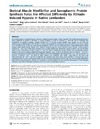Please use this identifier to cite or link to this item:
https://accedacris.ulpgc.es/jspui/handle/10553/6563
| Title: | Skeletal muscle myofibrillar and sarcoplasmic protein synthesis rates are affected differently by altitude-induced hypoxia in native lowlanders | Authors: | Holm, Lars Haslund, Mads Lyhne Robach, Paul van Hall, Gerrit Calbet, Jose A. L. Saltin, Bengt Lundby, Carsten |
UNESCO Clasification: | 241106 Fisiología del ejercicio | Keywords: | Protein Muscle Altitude Hypoxia |
Issue Date: | 2010 | Journal: | PLoS ONE | Abstract: | As a consequence to hypobaric hypoxic exposure skeletal muscle atrophy is often reported. The underlying mechanism has been suggested to involve a decrease in protein synthesis in order to conserve O(2). With the aim to challenge this hypothesis, we applied a primed, constant infusion of 1-(13)C-leucine in nine healthy male subjects at sea level and subsequently at high-altitude (4559 m) after 7-9 days of acclimatization. Physical activity levels and food and energy intake were controlled prior to the two experimental conditions with the aim to standardize these confounding factors. Blood samples and expired breath samples were collected hourly during the 4 hour trial and vastus lateralis muscle biopsies obtained at 1 and 4 hours after tracer priming in the overnight fasted state. Myofibrillar protein synthesis rate was doubled; 0.041+/-0.018 at sea-level to 0.080+/-0.018%hr(-1) (p<0.05) when acclimatized to high altitude. The sarcoplasmic protein synthesis rate was in contrast unaffected by altitude exposure; 0.052+/-0.019 at sea-level to 0.059+/-0.010%hr(-1) (p>0.05). Trends to increments in whole body protein kinetics were seen: Degradation rate elevated from 2.51+/-0.21 at sea level to 2.73+/-0.13 micromolkg(-1)min(-1) (p = 0.05) at high altitude and synthesis rate similar; 2.24+/-0.20 at sea level and 2.43+/-0.13 micromolkg(-1)min(-1) (p>0.05) at altitude. We conclude that whole body amino acid flux is increased due to an elevated protein turnover rate. Resting skeletal muscle myocontractile protein synthesis rate was concomitantly elevated by high-altitude induced hypoxia, whereas the sarcoplasmic protein synthesis rate was unaffected by hypoxia. These changed responses may lead to divergent adaptation over the course of prolonged exposure. | URI: | https://accedacris.ulpgc.es/handle/10553/6563 | ISSN: | 1932-6203 | DOI: | 10.1371/journal.pone.0015606 | Source: | Plos One [ISSN 1932-6203], v. 5 (12), p. 7 |
| Appears in Collections: | Artículos |
Show full item record
SCOPUSTM
Citations
24
checked on Jun 8, 2025
WEB OF SCIENCETM
Citations
23
checked on Jan 18, 2026
Page view(s)
55
checked on Jan 11, 2026
Download(s)
73
checked on Jan 11, 2026
Google ScholarTM
Check
Altmetric
Share
Export metadata
This item is licensed under a Creative Commons License

